|
|
|
Sort Order |
|
|
|
Items / Page
|
|
|
|
|
|
|
| Srl | Item |
| 1 |
ID:
121488
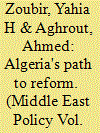

|
|
|
| 2 |
ID:
184741
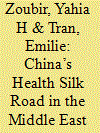

|
|
|
|
|
| Summary/Abstract |
The COVID-19 pandemic has offered China a unique opportunity for worldwide deployment of its longstanding health diplomacy, renamed the Health Silk Road (HSR), now an integral part of its Belt and Road Initiative. As a self-proclaimed South-South collaborator and developer,1Beijing has assumed a leadership role, grounded in ‘moral realism’, in the world’s health governance. Beijing’s health diplomacy has received acclaim in the Middle East and North Africa (MENA). However, the pandemic has exacerbated preexisting tensions between China, the United States (US) and European Union (EU). Western countries, wary of China’s rising power, reacted resentfully, confirming underlying systemic rivalry. This article argues that the currently disputed, or shifting, world order accounts for the diametrically opposed reactions between the West and the MENA toward China’s Health Silk Road.
|
|
|
|
|
|
|
|
|
|
|
|
|
|
|
|
| 3 |
ID:
140487
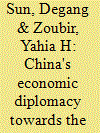

|
|
|
|
|
| Summary/Abstract |
Since the outbreak of the Arab revolts in late 2010, China has adhered to its ‘business-first’ economic diplomacy towards the Arab countries, a policy driven by China's ongoing geoeconomic interests. The ten-year-old China–Arab States Cooperation Forum serves as the nucleus for China's economic diplomacy in the region. The Chinese authorities have also initiated interagency coordination and central–local governments' power sharing in order to pursue this diplomacy successfully. However, while its economic diplomacy may be evolving, China, unlike what it has achieved in Black Africa, seems to have failed to develop strategic, political and cultural exchanges with its Arab counterparts. The intertwined geopolitical and geoeconomic factors that have emerged since the Arab revolts might make it harder for China to reap economic benefits while shelving political entanglement to sustain this economic diplomacy in the longer run.
|
|
|
|
|
|
|
|
|
|
|
|
|
|
|
|
| 4 |
ID:
080955
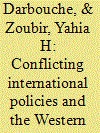

|
|
|
|
|
| Publication |
2008.
|
| Summary/Abstract |
The Western Sahara conflict is a 32-year old case of decolonisation that has been on the UN Security Council's agenda since 1991. Despite the straightforwardness of the stalemate in terms of international legality, the UN has been unable to implement its own provisions on the issue. The UN's failure is due to the contradictions arising from the interaction throughout the conflict between international law and geopolitics. Morocco's supporters in the UNSC have not only allowed it to systematically violate international law but have encouraged Morocco to formalise its irredentism through its "Autonomy Initiative". This behaviour is perilous not only for the stability of the Maghreb but for the UN system as well.
|
|
|
|
|
|
|
|
|
|
|
|
|
|
|
|
| 5 |
ID:
116872
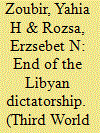

|
|
|
|
|
| Publication |
2012.
|
| Summary/Abstract |
The 42-year dictatorship in Libya finally collapsed in October 2011; it took the Western-backed armed uprising seven months of intensive fighting to defeat Qaddafi's loyalist forces. The fall of the Qaddafi regime is a welcome development in the Middle East and North Africa region. But, unlike Tunisia or Egypt, Libya does not have a standing army or a reliable potential force that can bring the necessary stability for a political transition. The tribal nature of the country and the difficulty of disarming the rebels and other groups pose serious challenges to the new authorities in Tripoli. Unless these issues are handled effectively, Libya will undergo a long period of unpredictability.
|
|
|
|
|
|
|
|
|
|
|
|
|
|
|
|
| 6 |
ID:
189850


|
|
|
|
|
| Summary/Abstract |
Turbulent events on the world stage are leading to inevitable changes, but
what kind of changes? Can we understand what the world situation will
look like when the current crisis ends? We have asked leading intellectuals
from countries outside the Western community to share their thoughts.
|
|
|
|
|
|
|
|
|
|
|
|
|
|
|
|
| 7 |
ID:
177516
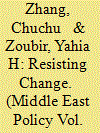

|
|
|
|
|
| Summary/Abstract |
A recurrent question is whether Islamist parties surreptitiously capitalize on political change to weaken or establish their own authoritarianism. In this article, we contend that the answer to this question depends largely on how ruling elites in authoritarian systems structure and manage the Islamist marketplace, thus affecting the position of Islam in politics and society. In our comparative analysis of Tunisia and Algeria, we distinguish between a state-dominated Islamist marketplace and a managed, open, pluralist Islamist marketplace. We postulate that Islamist parties in monopolized Islamist marketplaces are more likely to gain ground when they challenge authoritarianism. Thus, the marginalization/repression of Islamist political parties cannot, nor should it, seek to eliminate Islamist sentiments, while the opening of an Islamist pluralist marketplace is less likely to produce a hegemonic Islamist political party. The analysis of the trajectories of the Islamist movements informs on the management of Islamism and provides lessons for the Middle East and North Africa (MENA) and, conceivably, Islamic States elsewhere. Therefore, both policy makers and academics should renounce “de-Islamizing” an Islamic society and focus instead on judicious approaches to managing Islamism in Muslim-dominated societies and integrating Islamist parties into a democratic polity.
|
|
|
|
|
|
|
|
|
|
|
|
|
|
|
|
| 8 |
ID:
114942
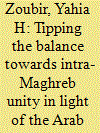

|
|
|
|
|
| Publication |
2012.
|
| Summary/Abstract |
In the late 1980s, prospects for Maghreb integration were high; the process of integration reflected the aspirations of Maghreb states and societies. However, analysis shows that the process was merely a response to internal and external events of that period, namely, economic difficulties, 'fortress Europe', and the rise of radical Islamism. Following the Arab Spring, incessant calls for unity have re-emerged. Once again, these calls for unity, after a long period of tense relations, especially between Algeria and Morocco, have resulted from internal and external constraints. The threats to the incumbent regimes and/or the insecurity prevailing domestically and at the borders have compelled the Maghreb states to seek greater cooperation to overcome the hardships with which they are faced.
|
|
|
|
|
|
|
|
|
|
|
|
|
|
|
|
| 9 |
ID:
071504
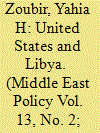

|
|
|
| 10 |
ID:
091824
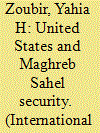

|
|
|
|
|
| Publication |
2009.
|
| Summary/Abstract |
Although the Maghreb has never been a priority, it now represents a region of significant interest for the United States. The importance of the Maghreb, and its Sahel extension, springs first from political and economic/energy interests, and second, from military, strategic and security concerns. The first relates to America's energy needs in the region, as well as to the regionalization that could create a potentially lucrative market for US businesses, especially since competition with China has increased over its recent gains in Africa. The second motivation, linked to the first, stems from Washington's new strategy and security policies initiated since 9/11 which have heightened the need for a new type of management concerning security, Islamism, terrorism, and, for a time, democratization. Unquestionably, the problems of terrorism, illegal migration, and other illegal activities are symptoms which cannot be understood if they are disconnected from their causes. However, rather than promoting economic development and good governance, the United States has focused predominantly on hard security matters and established a security system in the region which has continued under the Obama administration. Furthermore, Washington has not so far distanced itself from the regimes in the region whose authoritarianism, mismanagement of the economy, and violation of civil liberties is precisely what brought about the ills from which the Maghreb-Sahel suffers. Without addressing these issues therefore, there is little chance that the region will witness long-lasting peace, security, and prosperity. Furthermore, the protracted conflict in the Western Sahara, the resolution of which has been impeded by the geopolitical considerations of outside powers, has not only hindered the necessary construction of an integrated Maghreb, but also has the potential of leading to regional conflict.
|
|
|
|
|
|
|
|
|
|
|
|
|
|
|
|
|
|
|
|
|